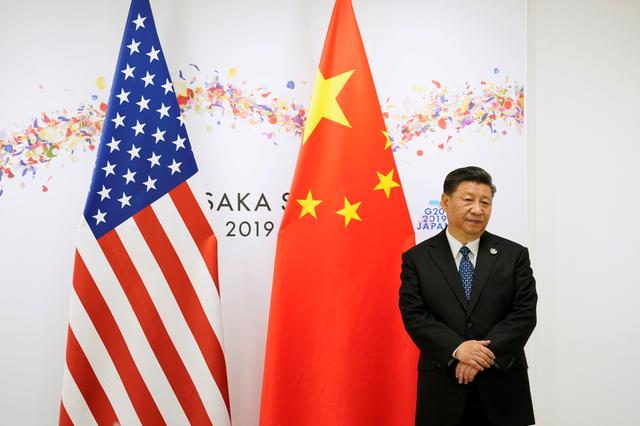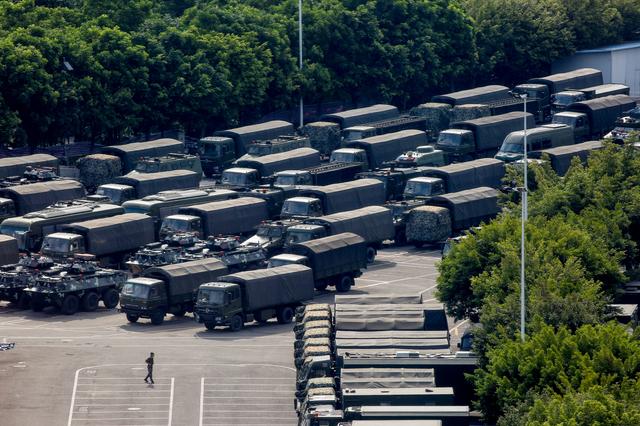Chinese exceptionalism: Morality, not law, is sacrosanct
George Yeo
South China Morning Post
Sun, 04 Aug 2019 13:25 UTC
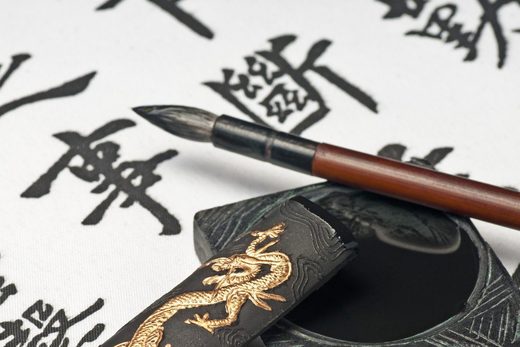
© Shutterstock
Two thousand years ago, with only loose translations available, it was difficult to employ the rule of law.
The following is an edited excerpt from a speech given by Yeo to a school in Singapore
Rudyard Kipling said in his famous ballad: "East is East, and West is West, and never the twain shall meet." Whether we like it or not, the twain are meeting again, and creating and opening a new chapter in history. When we read about the
trade war and
Huawei, and we read about the anti-China - and increasingly anti-Chinese - sentiment in the
United States, one recalls Kipling's famous line. But for him the East was not
China. For him East was
South Asia, where he spent many years of his life.
For my address this morning, I would like to confine the East to the realm of the "chopsticks people". There is a reason for this. There is a coherence to the culture of the chopsticks people.
It is not possible to understand the history of Vietnam, Korea or Japan without reference to the great drama on the Chinese mainland. Japan was the first to peel off from the Asian mainland to address the challenge of Western imperialism. By the time of the second opium war, any Japanese ship landing on the Asian mainland would be inspected by the Europeans, probably a Briton, and Japan knew it was only a matter of time before she would suffer the same humiliation.
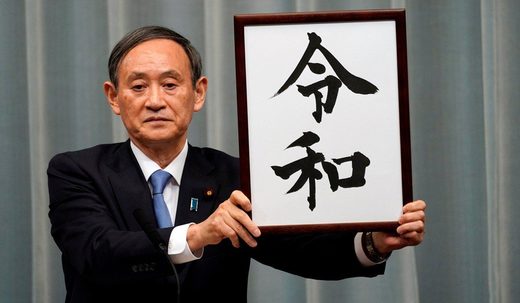
© Reuters
Japan's Chief Cabinet Secretary Yoshihide Suga unveils 'Reiwa' as the name of the new emperor's era. For the first time, Japan decided not to draw the name from the Chinese classics, but from an ancient Japanese poem.
This led to the Meiji Restoration and a top-to-bottom overhaul of Japanese society to the point where she became an imperial power ravaging the Chinese mainland. But when we read about the quarrels between Japan and Korea, the roots are in the encounters of East and West.
This year, when the new Japanese emperor ascended the throne, the Japanese had to find a title for his reign. This is an old Chinese tradition. Historically the reign titles have composed of two characters drawn from the Chinese classics. But for the first time they decided not to draw from the Chinese classics, but from an ancient Japanese poem. They chose the characters
ling he, or
reiwa .
Ling has a double meaning. The ordinary meaning is of course "to order", but they have said: "No, that's not the meaning. The meaning is beautiful."
This is an obscure meaning and is how they interpret it. This is Japanese culture - the chopsticks people can instinctively understand this double meaning - which they like.
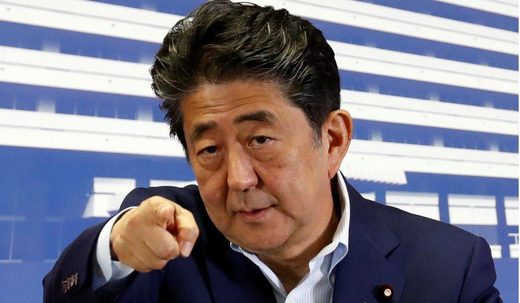
© Reuters
Japanese Prime Minister Shinzo Abe will from now on be known as Abe Shinzo. Japan is 're-Asianising'.
.
At about the same time, an instruction was sent out that henceforward, instead of calling the prime minister
Shinzo Abe, he would be called Abe Shinzo. As a result of the Meiji Restoration, the Japanese decided to go Western and inverted when they dealt with the world outside, but he will now be Abe Shinzo.
Japan is therefore re-Asianising, but is very conscious that in the process, it should not become a satellite of China. This is a long process. You find equivalent processes happening in Korea - North and South - and in Vietnam.
But to understand all these things, we have to understand China.
Governing by law vs etiquette
The reason the May Fourth Movement happened was because there was such deep inertia in Chinese society. That period from the opium wars to
Taiping Tian Guo (the Taiping Heavenly Kingdom regime) and
Xinhai Geming (Xinhai Revolution of 1911) - all the way to the Great Leap Forward and
Cultural Revolution, and finally, Deng Xiaoping and now
Xi Jinping - it is the greatest revolution in human history. It is the greatest revolution because
the Chinese people are the most homogeneous among human beings on Earth. And this is the result of centuries of social evolution.
If you are small, the change can come quickly. If you are big, it takes a long time to change internal systems. Each of us has a brain, and the brain is probably the most complex assembly of molecules, of atoms, in the known universe.
And our ability to create civilisation is because
we have a collective brain, which means we are networked together to one another and to our history, to our ancestors. These operating systems linking us all together are our culture.
Artificial intelligence (AI) may be able to replicate what goes on in an individual brain. But I don't see AI replicating what is in the collective brain because the collective brain is much more complicated.
What is it about Chinese civilisation that gives it its homogeneity?
China today is over 90 per cent Han - and has been for a long time. Is this because Chinese empires were not able to colonise neighbouring countries, incorporate them and therefore reduce the Han proportion? That's not the reason.
The reason is something that happened
2,000 years ago when Emperor Qin Shihuang, by force, united the Warring States. It was a system based on legalist principles, ruled by strict laws. It was so tough that the Qin dynasty did not survive his son. People were happy to get rid of him, and for a long time after that, until the modern era, he was cursed - for burying scholars, for destroying ancient books, for his brutality and vulgarity.
Governing by law vs etiquette
The Han, when they took over, decided on a different organising principle of Chinese society based on li - li mao de li [politeness and etiquette].
[British biochemist, historian and sinologist] Joseph Needham once wrote that it is not that China had no law, no legislation, but in fact, if you look at history,
China had a greater corpus of legislation than the Western world.
But in China, when it comes to the emperor, does the emperor decide on the basis of
fa [law] or
li? It has to be on the basis of
li.
So
fa can be an instrument, a way of regulating large numbers,
but ultimate decisions, especially ultimate moral decisions, are based on li. This is very different to the Western world.
Many of us watched the hearing confirming
Brett Kavanaugh as the Supreme Court justice in the US. It was almost a struggle to the death.
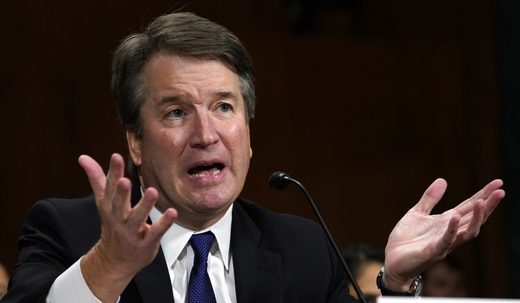
© AP
Brett Kavanaugh.
Today
[Donald] Trump has appointed two conservative Supreme Court judges. If he appoints one or two more - if he gets a second term - the final interpretation of law in the US will be fixed for the next few decades. In a sense, this is much more important than any congressional or presidential election in shaping the direction and evolution of US society in this century.
But
these are the rules, and the Americans fight according to the rules. Like hell. So
Robert Mueller, the
"four horsewomen of the apocalypse" [congresswomen Ayanna Pressley, Alexandria Ocasio-Cortez, Rashida Tlaib and Ilhan Omar], impeachment exercises - in the end everything goes back to the law.
The chopsticks people view all this with a combination of disdain, astonishment and awe. How could a system operate like this? How could the leader of a country be subject to all these pressures and still be in a position to govern?
This almost punctilious adherence to legal principles is quite alien to the chopsticks people. For them, for the Chinese, you have got to look at the overall picture. Should you or should you not? If you should, then you find a way to do it.
The advent of paper and parallels with modern tech
So East is East, and West is West. And why has this been so enduring?
I've been mulling over this for a long time and one reason is paper technology. The Chinese had paper for over 2,000 years. According to the books, it was Cai Lun [who invented paper], but the Chinese probably had earlier forms of paper before that.
Paper required ink. Ink was based on carbon black. Carbon black is made from soot. The particles are nano-sized, and the ability to spread the soot on the paper using water was a complex process. But
it enabled the Chinese to store data and to manipulate data on a scale and volume unmatched by anybody else.
The Chinese had this advantage for centuries. It was only after the eighth century, after a big war in Central Asia, when the Tang army was defeated by the Abbasid army, when Chinese prisoners were captured and paper technology went to the Islamic world. Within a short time, paper mills were established in Bukhara, Damascus and Baghdad.
This transformed Islamic civilisation, and eventually
it was the Muslim scholars who brought the classics from Greece through Muslim Spain into Europe, and that began the process of European revival.
You know, today when we read about Huawei, they want to deny Huawei the use of Android. Android is not just an operating system but it also means all the apps which are latched onto Android.
They say the Android ARM's central processing unit architecture is proprietary and can be denied to China. It may take China a few years to overcome these setbacks.
Language and control
But you can imagine, China had an advantage in paper for centuries. The programmers back then were the scholars because they were able to master the brush, which requires years of education. The brightest people were chosen by examination to be the software experts and they kept detailed records.
I've been stealing time the last two weeks to watch a video on my iPad. It is called
The Longest Day in Changan and is right now all the rage in China. It will be China's No 1 drama this year.
It is about one day in Changan [in Shaanxi province] during the Tang dynasty. It combines drama with intrigue. But the care with which the makers were accurate to the history, the architecture, the dress, the food, the behaviour of the people, the make-up, is fascinating. But the aspect which fascinated me the most was the record-keeping in Changan, and who had access to those records and the database. All control in the end came to this - who had control over the database.
China had this advantage, and whether by design or by accident,
a writing system which was not phonetic. If a language is phonetic, then the words change all the time. It is very difficult to read [Geoffrey] Chaucer as the English of the time was different because the pronunciations have since changed. But
Chinese characters are digitalised. The icon has a fixed value.
The context might have changed, the meaning in context might have changed, but you can read a character and you know its meaning. For whatever reason,
this has created a very cohesive civilisation, very conscious of itself, very conscious of what is within and without, and a civilisation wanting to keep the outside away so they can nurture what is within.
Comment: This is in marked contrast with the West, where insight is extremely rare. On the other hand, the West conquered, developed, changed almost everything 'without'. Even out into space!
Moral systems and the rise and fall of empires
It was the church - the Jesuits, when they went to China and wanted to convert China - who began to interpret China for the West, and they were astonished by the fact that
China had a moral system without religion. In the West, they were looking for moral systems without religion because the encroachment of the church on all aspects of society was too tight.
So this led to the Protestant Reformation, it led to the Thirty Years' War, and finally, intellectuals like [French Enlightenment writer, historian, and philosopher] Voltaire, who found in China a system that could operate morally without religion. This inspired a new generation of idealists [wanting to do away] with the church, away with clericalism - a new Western society. China helped to lay the basis of the French Revolution.
But this removal of religion from European society is now creating new issues.
In America - which was founded a few years before the French Revolution - religion is still a very important part of society, and
the big struggle in America today is between secularists and those who are believers in one religion or another. It is complex, I'm just simplifying, but in Europe today, if you go to the churches, they are mostly empty, and secularisation is creating a new age of confusion in Europe, but that's a different story.
What I want to conclude with is to say that as
the I Ching [Book of Changes, an ancient Chinese divination text] teaches us, there are cycles within cycles. China may be on the way up today. One day it will peak, one day it will decline. Europe may be struggling now, but one day it will recover and come up again. The US is also going through a cyclical change.
There must be a humility in whatever stage of the cycle we are in - particularly if we are up, one day we will be down. When we have that humility and see in another person an identity with a history like our own, who has his good points and his own wisdom from which I can learn and benefit, then we will have a better world.
About the author
George Yeo is a former Singaporean minister for foreign affairs, and is the chairman and executive director of Kerry Logistics Network. This is an edited excerpt from a speech given by Yeo at the Hwa Chong Institution, an independent school in Singapore
Comment: You get a sense of the longevity and cohesiveness of China when you consider that the modern designation of 'Han Chinese' as the dominant ethnic sub-group is in fact a 2,000-year-old political designation. 'Han' is not an ethnicity, just as someone resident in the EU today is not an 'EUan'. 'Han' can refer to any number of the many ethnicities who were united under the Han dynasty - and have substantially remained united ever since.
China is really a two-millennia-old 'United States of East Asia'.
See also:

